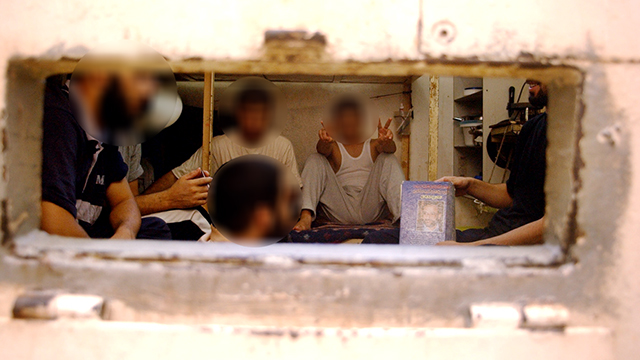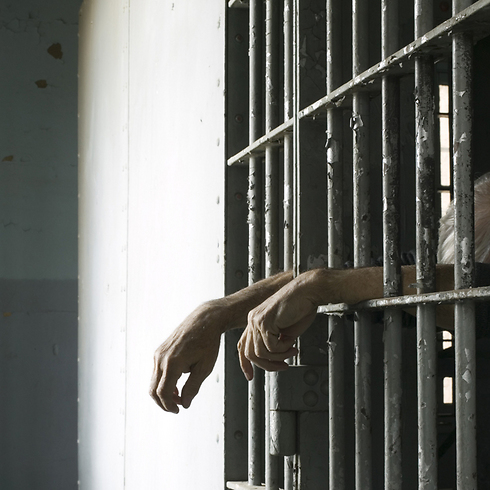Two NGOs release testimony of 116 Palestinian security detainees who complained of harsh prison conditions, deprivation of sleep and food, and use of violence; Shin Bet says report is distorted and biased.
The B’Tselem and HaMoked NGOs on Wednesday issued a draft report containing testimony from 116 Palestinian security detainees accusing Israel of extremely harsh conditions, including deprivation of sleep and food.
In one case, A., a Palestinian in his thirties from a refugee camp near Ramallah, described his imprisonment in the interrogation facility of Shikma Prison in Ashkelon in 2013.
“I was forced to sit for three or four days on a very low chair in a freezing room, with the air conditioner constantly on cold,” he said. “I complained that I want to see a doctor because at some point I felt bad, and only after two days was I examined. The doctor handed me a paracetamol pill and that was the end of the medical treatment. The behavior towards me was very bad. They put me in solitary confinement in a dirty little cell where I was detained for a month. There was a bright light that was on 24 hours a day. One day, after a month, suddenly they told me they were letting me go. I came home and I suffered for a long time from pain in my body and especially in my back. ”

The report suggested that this detainee’s experience is typical. The authors collected testimonies of 116 Palestinians who were interrogated in Shikma Prison between August 2013 and March 2014.
The testimonies suggest that the harsh detention conditions are an integral part of the interrogation itself, and the authors state that the goal is to weaken the prisoner’s body and spirit, in parallel with the questioning in interrogation rooms. According to the report, this combination is abuse that in some cases amounted to torture, and is used systematically against Palestinian detainees in Shikma Prison in violation of international law and the High Court of Justice ruling that banned the use of torture during interrogation.

The testimonies include multiple reports of a policy that includes violence and humiliation during detention, inhumane conditions in crowded and filthy facilities, cutting off a detainee from the outside world while causing loss of orientation, decreased amounts and inferior quality of food, exposure to extreme heat and cold, prolonged handcuffing to the interrogation chair at various painful angles and postures, long-term sleep deprivation, threats, curses, shouts and insults.
“Being in solitary confinement was difficult,” said Awad Raydan, 21, from the village of Qibya. “You do not know when it is day and night. You feel like you’re in the grave and you begin to dream and imagine things. I wondered sometimes if I was alive or dead.”
Hosni Najjar from Hebron talked about the sleep deprivation he experienced: “For three or four days I was interrogated continuously without a break. Both of my hands were bound behind me all the time, except when eating and going to the bathroom. Sometimes I fell asleep and the interrogator yelled loudly in my ears and woke me up. The interrogators switched and it went on and on.”
Shin Bet: Detainees have full rights
The Justice Ministry said in response: “The report was written in a biased manner and is based on an unrepresentative sample intended to distort the existing realities in terms of treatment in the detention facility, including various procedures relating to detention and interrogation. Presenting a report with individual cases containing identifying information denies the relevant actors the possibility of examining the allegations. ”
The Shin Bet said in response: “The Israel Security Agency wishes to clarify that there is in the High Court a pending appeal dealing with B’Tselem’s draft report. Because the state submitted a detailed response that rejects the claims, the Shin Bet does not intend to address the claims made in the draft report in a biased and distorted manner. It should be noted that the Israel Security Agency’s investigations are carried out in accordance with the law and with the aim of preventing activities designed to harm national security. The agency’s activity is subject to supervision and extensive control by internal and external factors, including the state comptroller, the State Attorney’s Office, the attorney general, the Israeli Knesset, and the courts “.
The Prison Service said: “The prevailing conditions in Shikma Prison are not similar to those described in the report and comply with the legal requirements regarding the holding of detainees. It is must be further emphasized that the physical conditions in the interrogation facilities are not designed to serve the Shin Bet’s interrogation practices. Prison Service detention facilities are under constant review by several internal and external auditing entities that supervise what is happening in the detention facilities. ”
Amnesty International’s annual report, released Wednesday, also criticized human rights in Israel, accusing the country of extrajudicial executions, arbitrary arrests, torture, excessive use of force, and more.
As reported by Ynetnews
